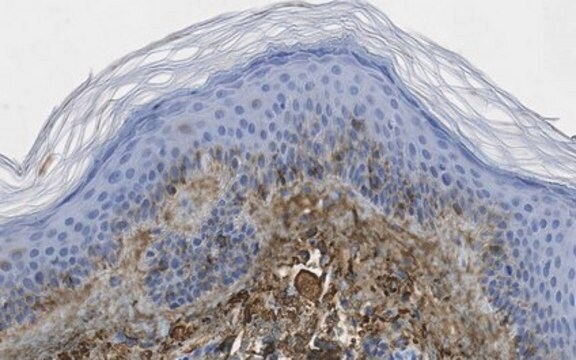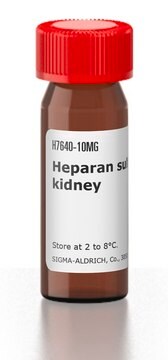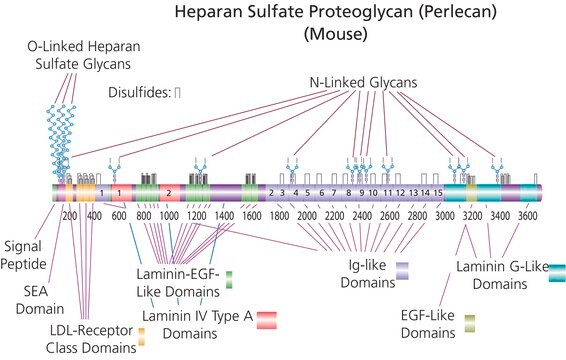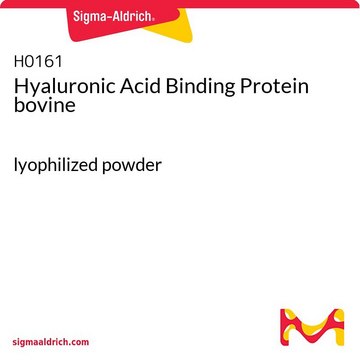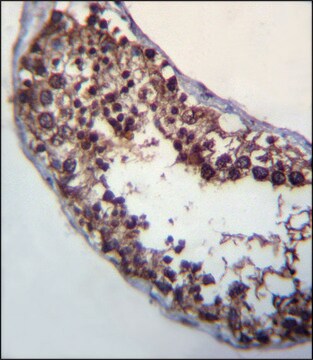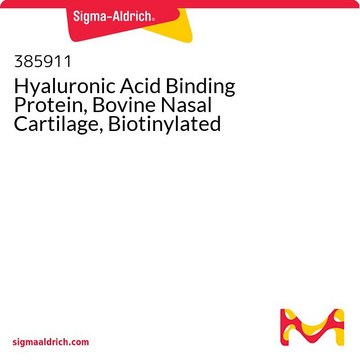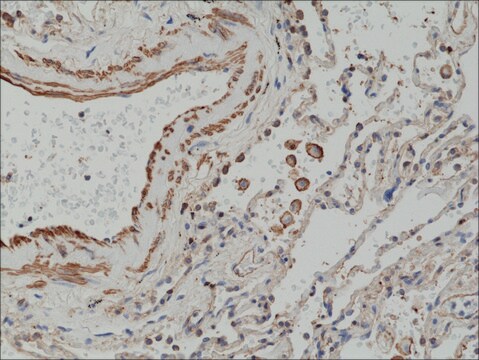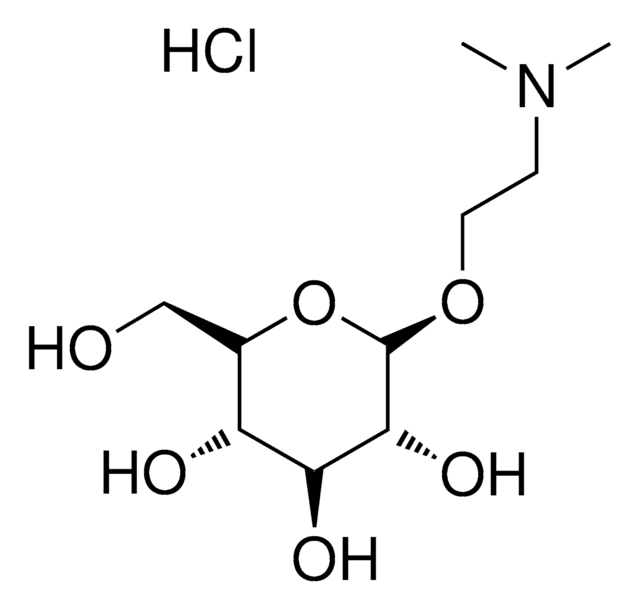MAB2022
Anti-Keratan Sulfate Antibody, clone EFG-11
ascites fluid, clone EFG-11, Chemicon®
Autenticatiper visualizzare i prezzi riservati alla tua organizzazione & contrattuali
About This Item
Codice UNSPSC:
12352203
eCl@ss:
32160702
NACRES:
NA.41
Prodotti consigliati
Origine biologica
mouse
Livello qualitativo
Forma dell’anticorpo
ascites fluid
Clone
EFG-11, monoclonal
Reattività contro le specie
sheep, bovine, pig, canine, mouse, human
Produttore/marchio commerciale
Chemicon®
tecniche
ELISA: suitable
radioimmunoassay: suitable
western blot: suitable
Isotipo
IgG2b
N° accesso NCBI
N° accesso UniProt
Condizioni di spedizione
dry ice
modifica post-traduzionali bersaglio
unmodified
Informazioni sul gene
human ... LUM(4060)
Specificità
Recognizes 2-3 disaccharide units on both skeletal (type II) and corneal (type I) keratan sulfate chains either in isolated or proteoglycan-bound form. The epitope is resistant to proteolytic or alkaline cleavages and partially sensitive to keratanase or other endo-B-galactosidase treatment.
Immunogeno
Human articular cartilage proteoglycan digested with chondroitinase ABC.
Applicazioni
Anti-Keratan Sulfate Antibody, clone EFG-11 is an antibody against Keratan Sulfate for use in ELISA, RIA & WB.
Research Category
Cell Structure
Cell Structure
Research Sub Category
Cytokeratins
Cytokeratins
Western blot at 1:1000 - 1:4000
ELISA at 1:5,000-1:20,000
RIA at 1:30,000-1:500,000
May be used in a competitive inhibition assay to measure keratan sulfate levels.
ELISA at 1:5,000-1:20,000
RIA at 1:30,000-1:500,000
May be used in a competitive inhibition assay to measure keratan sulfate levels.
Stato fisico
Ascites liquid, no preservative.
Stoccaggio e stabilità
Maintain at -20°C in convenient aliquots for up to 12 months. Avoid repeated freeze/thaw cycles.
Note legali
CHEMICON is a registered trademark of Merck KGaA, Darmstadt, Germany
Esclusione di responsabilità
Unless otherwise stated in our catalog or other company documentation accompanying the product(s), our products are intended for research use only and are not to be used for any other purpose, which includes but is not limited to, unauthorized commercial uses, in vitro diagnostic uses, ex vivo or in vivo therapeutic uses or any type of consumption or application to humans or animals.
Codice della classe di stoccaggio
10 - Combustible liquids
Classe di pericolosità dell'acqua (WGK)
WGK 1
Punto d’infiammabilità (°F)
Not applicable
Punto d’infiammabilità (°C)
Not applicable
Certificati d'analisi (COA)
Cerca il Certificati d'analisi (COA) digitando il numero di lotto/batch corrispondente. I numeri di lotto o di batch sono stampati sull'etichetta dei prodotti dopo la parola ‘Lotto’ o ‘Batch’.
Possiedi già questo prodotto?
I documenti relativi ai prodotti acquistati recentemente sono disponibili nell’Archivio dei documenti.
E J Thonar et al.
Arthritis and rheumatism, 28(12), 1367-1376 (1985-12-01)
We have developed an enzyme-linked immunosorbent-inhibition assay which makes use of a monoclonal antibody specific for keratan sulfate to quantify keratan sulfate present as single chains in adult human serum. In adults hospitalized with conditions not thought to affect the
Proteoglycan epitopes as potential markers of normal and pathologic cartilage metabolism.
V C Hascall et al.
Arthritis and rheumatism, 30(5), 586-588 (1987-05-01)
Respiratory syncytial virus infection of human airway epithelial cells is polarized, specific to ciliated cells, and without obvious cytopathology.
Liqun Zhang, Mark E Peeples, Richard C Boucher, Peter L Collins, Raymond J Pickles et al.
Journal of virology null
Transplantation of mesenchymal stem cells in a canine disc degeneration model.
Akihiko Hiyama,Joji Mochida,Toru Iwashina,Hiroko Omi,Takuya Watanabe,Kenji Serigano et al.
Journal of Orthopaedic Research : Official Publication of the Orthopaedic Research Society null
Liping Yang et al.
Journal of the Association for Research in Otolaryngology : JARO, 19(4), 353-362 (2018-04-25)
Otoconia-related vertigo and balance deficits, particularly benign paroxysmal positional vertigo (BPPV), are common. Our recent studies in humans show that, while BPPV prevalence greatly increases with age in both genders, peri-menopausal women are especially susceptible. In the present study, we
Il team dei nostri ricercatori vanta grande esperienza in tutte le aree della ricerca quali Life Science, scienza dei materiali, sintesi chimica, cromatografia, discipline analitiche, ecc..
Contatta l'Assistenza Tecnica.